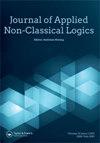离散时间区间时间逻辑的分离定理
Q1 Arts and Humanities
引用次数: 1
摘要
Gabbay关于线性时间逻辑与过去的分离定理是时间逻辑中最有用的理论结果之一。本文建立了关于Moszkowski离散时间命题区间时间逻辑()的一个类似命题,该命题具有两组展开模态,即一元邻态和s斩算子的二元弱逆。我们证明了分离对有和没有它的循环构造都成立。本文章由计算机程序翻译,如有差异,请以英文原文为准。
A separation theorem for discrete-time interval temporal logic
Gabbay's separation theorem about linear temporal logic with past has proved to be one of the most useful theoretical results in temporal logic. In this paper, we establish an analogous statement about Moszkowski's discrete-time propositional Interval Temporal Logic ( ) with two sets of expanding modalities, namely the unary neighbourhood modalities and the binary weak inverses of 's chop operator. We prove that separation holds for both with and without its loop construct chop-star.
求助全文
通过发布文献求助,成功后即可免费获取论文全文。
去求助
来源期刊

Journal of Applied Non-Classical Logics
Arts and Humanities-Philosophy
CiteScore
1.30
自引率
0.00%
发文量
8
 求助内容:
求助内容: 应助结果提醒方式:
应助结果提醒方式:


